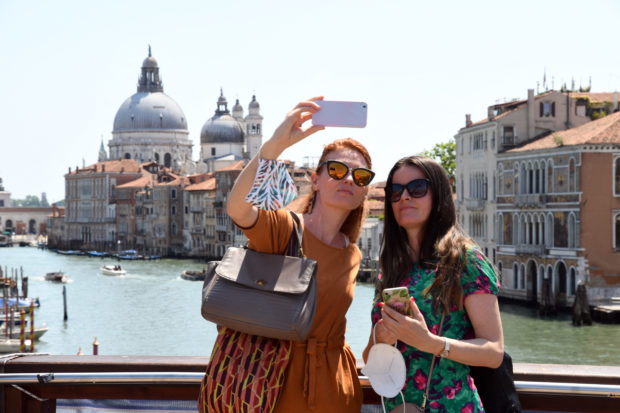EU revives bloc-wide travel with Covid pass but Delta poses threat

In this file photo taken on June 03, 2021, tourists take selfie pictures on the Ponte dell’Accademia bridge over the grand canal in Venice. AFP
BRUSSELS — An EU-wide Covid certificate for easier travel comes into force on Thursday, just in time for Europe’s busy summer vacation period, but the more-infectious Delta variant is already threatening to curtail its use.
The EU document — essentially a QR code made available in digital form on smartphones or hard copy — shows whether the bearer is vaccinated with one of the EU’s approved jabs (from BioNTech/Pfizer, AstraZeneca, Moderna or Johnson & Johnson), has recovered from an infection, or has a recent negative Covid test.
Under EU law, the certificate is meant to do away with the need for quarantines or further testing when travelling between the EU’s 27 countries or four associated European nations (Iceland, Norway, Switzerland and Liechtenstein).
EU Justice Commissioner Didier Reynders said he expected all EU member states to be connected from Thursday. Only Ireland, which was hit by a cyber-attack targeting its health service in May, will lag behind.
As of Wednesday, 21 EU countries were already accepting the certificate, including major tourist destinations France, Spain, Italy, Greece and Croatia.
“We recommend to all the member states to use such a tool not only for the free movement law… but also for all the possible national uses, for other purposes: to go to concerts, festivals, theaters, restaurants,” Reynders said.
But a surge in the Delta variant, first detected in India and now rampant in former EU member Britain, could trigger an “emergency brake” provision suspending its acceptance.
Already Germany has announced a ban on incoming travelers from Portugal, where the Delta variant has become dominant. Only its own citizens or residents are exempted if they quarantine for two weeks.
Berlin’s decision has raised Brussels’ ire, with Reynders saying “we should avoid travel bans” within the EU and stressing that Germany should have consulted with its partners first.
Britain’s Delta problem
Britain’s startling rise in Delta infections — it now has a rolling two-week infection rate more than seven times that of the EU — is generating deep concern on the continent.
At an EU summit last week, German Chancellor Angela Merkel criticized southern EU countries — desperate for tourist cash — for allowing in Britons with few, if any, Covid checks.
This week, Portugal, Spain and Malta all abruptly increased restrictions for travelers from Britain, emphasizing full vaccination for entry.
Beyond the EU certificate, Brussels is urging all member states to allow in only fully vaccinated travelers from outside the bloc, or those with urgent reasons to visit.
But, unlike for the certificate, that is only “guidance” that can be ignored.
Even the EU certificate may not be the fillip many hope for.
“There is no doubt that the tourist industry could do with a boost in time for the summer season,” economic research consultancy Capital Economics said in a note.
But it forecast the EU certificate “will have very little impact on European tourism this year,” observing that “most adults are not fully vaccinated and the Delta variant is making people and governments more cautious”.
Airlines worry
Airlines grouped together in an umbrella lobby group, A4E, have expressed worries that an “inconsistent approach” among EU countries in vetting the EU Covid certificate could create lengthy lines in airports with the potential to “create new health hazards”.
They called for the certificates to be checked online before travelers even arrived at the airport.
Reynders responded by saying the European Commission stood by to help with technical implementation, but stressed that the fact there was one EU certificate rather than 27 national ones already greatly streamlined travel in the bloc.
Overall, EU governments are weighing the public desire for a summer break after a tough year of restrictions against a race between vaccination and the Delta variant.
AFP statistics collating official health data from across the EU show that 50.4 percent of the bloc’s population has now received at least one vaccine dose (compared with 65.7 percent in Britain).
So far, 32.7 percent in the EU are considered completely vaccinated.
Covid experts had initially believed “herd immunity” could be reached with 70 percent of a population fully vaccinated, but now judge it would need 80 percent or more immunized, given Delta’s infectiousness and the fact vaccines are less effective against it.
For more news about the novel coronavirus click here.
What you need to know about Coronavirus.
For more information on COVID-19, call the DOH Hotline: (02) 86517800 local 1149/1150.
The Inquirer Foundation supports our healthcare frontliners and is still accepting cash donations to be deposited at Banco de Oro (BDO) current account #007960018860 or donate through PayMaya using this link.